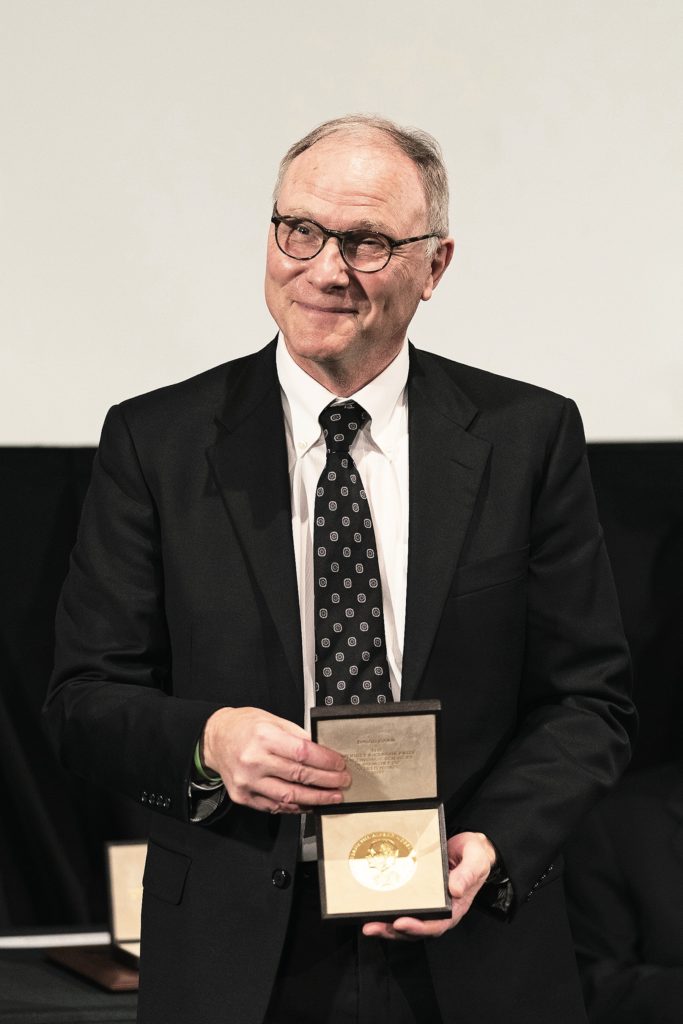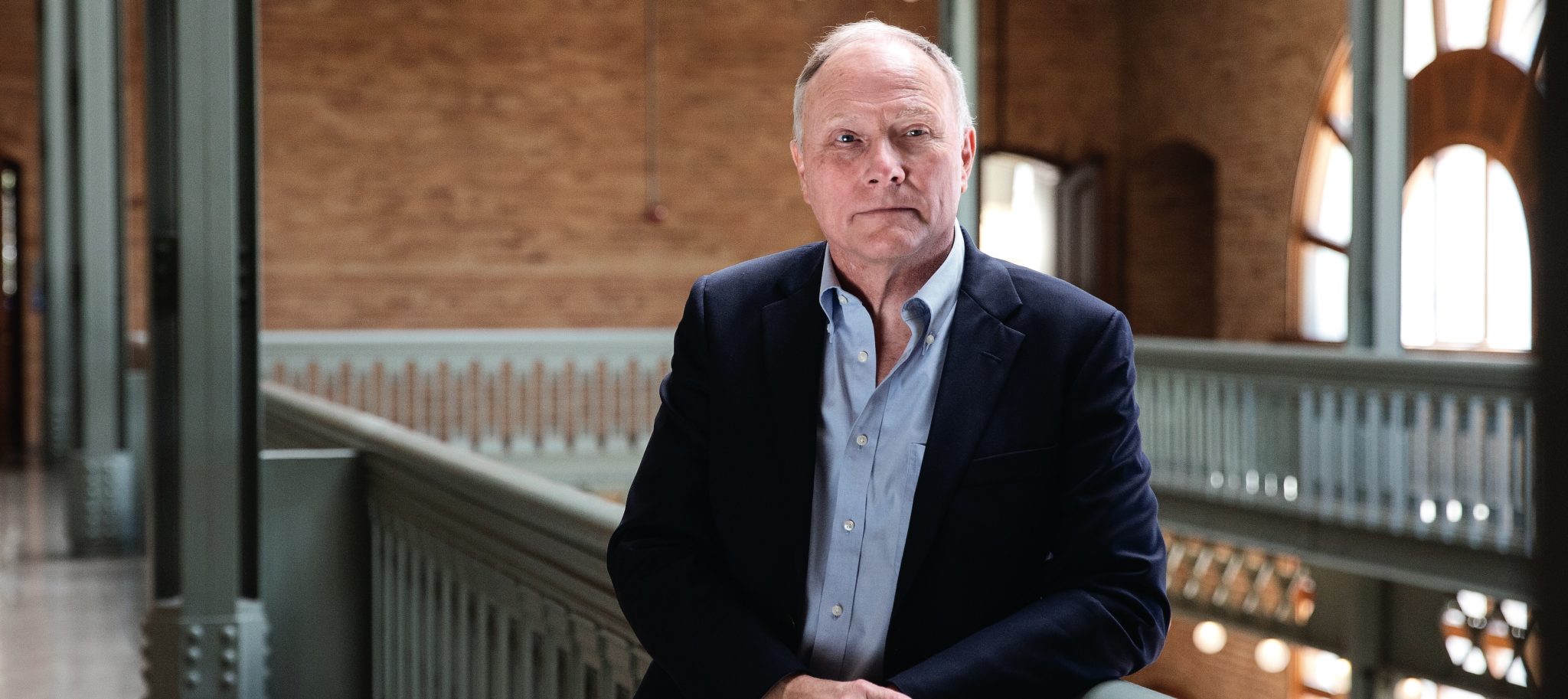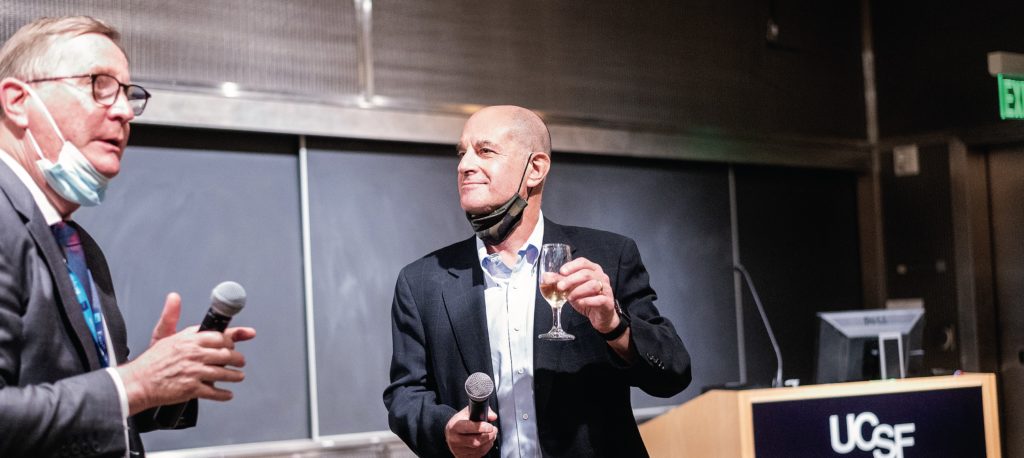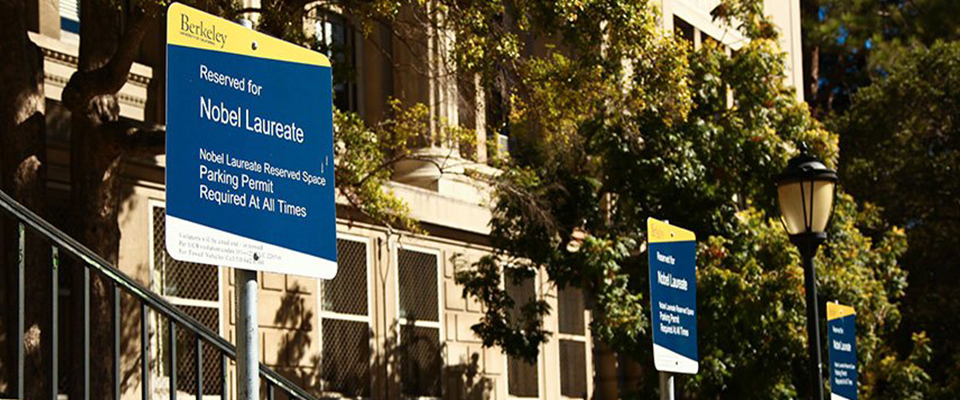When Cal professor and labor economist David Card got the early-morning phone call from Sweden last October informing him that he’d won the 2021 Nobel Prize in economics, he thought it was a buddy back home in Ontario pulling his leg. “My old friend, Tim, who lives in Guelph, I thought it was one of his practical jokes,” Card told the Canadian news media.
A self-described “ordinary guy,” the mild-mannered Card didn’t think he had “a very high probability” of winning the prize, which he shared with Guido Imbens and Joshua Angrist. In awarding Card half the prize, the Nobel committee recognized “his empirical contributions to labor economics,” and his co-recipients for “their methodological contributions to the analysis of causal relationships.” Causal relationships are at the heart of Card’s work as well, as illustrated in his landmark studies on the effects of minimum wage and immigration on employment.
When Card first started working on the minimum wage issue back in the 1980s, economics was still largely a conceptual field, emphasizing well-established theories like the law of supply and demand. If we think of wages as prices of labor, and market wages as merely reflecting the intersection of supply and demand, then a higher minimum wage should make labor unaffordable to employers, and unemployment should increase.
Card and his collaborators wanted to test that received wisdom by running a “ natural experiment”—i.e., an experiment not controlled in the laboratory but observed in the real world. When, in the early ’90s, New Jersey raised its minimum wage while neighboring Pennsylvania did not, they seized the opportunity to quantify and compare the relative effects on employment in fast food restaurants on each side of the border. Contrary to expectations, they found no evidence that the higher minimum wages reduced employment. In fact, they found that employment increased in New Jersey.
Card did similar work on immigration, examining the question of whether immigrants harm wages and employment for native workers. His most noted case study was the Mariel boatlift of 1980, in which 125,000 refugees from Cuba arrived in Florida, suddenly increasing Miami’s labor force. In studying the effect of the boatlift, Card compared Miami’s labor market with those in comparable cities with no such influx. Again, contrary to expectation, he found no effect on native-born low-skill workers.
Even though Card’s findings are data-driven and evidence-based, many economists have dismissed them—or worse. One critic, Nobel-winning economist James Buchanan, said that any claim that a higher minimum wage increases employment was “equivalent to a denial that there is even minimal scientific content in economics” and accused economists who bought into it of being “camp-following whores.”
Obviously, the Nobel committee begs to differ.
For his part, Card is self-effacing. “My contributions are pretty modest,” he said, according to Berkeley News. “It’s about trying to get more scientific tie-in and evidence-based analysis in economics. Most old-fashioned economists are very theoretical, but these days, a large fraction of economics is really very nuts-and-bolts, looking at subjects like education or health, or at the effects of immigration or the effects of wage policies. These are really very, very simple things. So, my big contribution was to oversimplify the field.”
Asked if that made the field better, Card answered, “Well, that was my belief, but you would probably get a mixed vote on that.”
The interview that follows was conducted by email. It began in the thick of Card’s preparations for the Nobel ceremony, which he attended virtually, and was completed shortly after the event. The exchange has been edited for length and clarity.

You grew up in Canada, and you’ve observed that economists’ parents tend to be faculty themselves. What was your childhood like, and what did your parents do?
I grew up in rural southern Ontario, near the city of Guelph, which is about 60 miles west of Toronto. My parents were dairy farmers—we lived on a farm that has been owned by my family since the 1820s. In the late 1950s and early 1960s, there were still many small farms in the area.
I initially went to a one-room school with five grades taught by a single teacher (one grade per row). By fourth grade, the one-room schools were closed, and I attended a modern elementary school, then a middle school and high school in Guelph. I was born in the peak year of the baby boom (1956), and the schools were packed: My high school had nearly 1,000 ninth graders. Many of the teachers were relatively young and just newly hired to teach the booming population.
I have always thought that was a huge benefit: They were new university graduates and well trained. We had very good math and sciences classes.
You worked in a steel factory many years ago and stumbled into economics by accident. Tell us a bit about that.
I had several jobs during college (or university, as it’s called in Canada); the best-paying was a steel fabrication plant that was unionized and had a very generous incentive plan. I worked on a machine with an older man who wanted to produce the equivalent of 12 hours of work each eight-hour day, so we could earn about 150 percent of regular pay. I got the job through a good friend’s father who was an executive at the plant. You needed contacts to get such jobs.
I was initially a physics major, but late in my second year, I helped my girlfriend at the time with her economics homework. I started to read the text and found it fascinating because economic models of agricultural markets really work pretty well.
When you started working on the minimum wage, public sentiment was not exactly in favor of raising it in the United States. Not even economists were excited about the idea. What got you interested in that subject at that time?
In 1980 (during grad school), I worked on a project with my advisor, Orley Ashenfelter, on the effect of minimum wages. We discovered a flaw in the then-current studies of the effect of minimum wage increases on lower-wage workers losing their jobs. The flaw was that lower-wage people are always more likely to be unemployed than higher-wage people a year later—whether the minimum wage was raised or not.
I realized there was room for better evidence on the effects.
I also knew that there were alternative models for how minimum wages work in economics and public policy. One set of models says they reduce employment, the other set says they can even increase employment. The second perspective was realized in 1933, but people tended to discount the second set of models. The first set of models assumes that employers pay their workers a wage determined by the market (and not by the employers themselves), whereas the second set assumes that each employer sets its own wage (rather than simply paying “the market” wage). I always thought the second set of models was interesting.
Was it controversial to study that subject then?
It was not such a big deal because in the 1980s there were almost no new studies of the minimum wage. The federal minimum wage was not raised between 1981 and 1990, and there had been no innovation in methods for studying the effect of the minimum wage since the mid-1960s. By the end of the 1980s, several new developments led to renewed interest in this topic, and several of us (me, Alan Krueger, Larry Katz [’81] at Harvard) got the idea to take a new look at the topic.
One thing was that in response to the freeze in the federal minimum wage, some states decided to raise their own minimums. This set the stage for “natural experiment” style case studies of state-specific increases—my first study looked at an increase in the California minimum wage in 1988.
Another factor was that starting in the early 1980s, labor economists had access to regular micro data on wages from the monthly Current Population Surveys, making it possible to study the effect of minimum wages on wages—a topic that was surprisingly never addressed in the older literature.
You are a pioneer of natural experiments. Your study on the Mariel boatlift is a prime example. What got you interested in that?
I had been working on the labor market effects of immigration with Joseph Altonji. I was unsatisfied with the evidence we had been able to assemble and found out about the Mariel boatlift from a senior at Princeton, Constantine Alexandrakis, who was my advisee and wrote a paper on the boatlift. I decided to try to write my own analysis comparing Miami to a set of other cities.
Your work played a huge role in convincing policy makers around the world to pursue higher minimum wages, and most economists are also now in favor. How did it feel to suddenly have everyone on board?
Actually, many economists are still not that supportive of wage regulations. They are less opposed than they used to be. There is a strong tendency in economics to believe that wages are too high. In [John Maynard] Keynes’s model of recessions, high wages prevent the economy from adjusting and lead to unemployment. And remember that Keynes is considered a liberal!
I stopped working on minimum wages in 1995, and for at least 10 years, there was not much effect of my work. When my book with Krueger (Myth and Measurement) was published in 1995, the press that published it was very disappointed with sales—it was not reviewed in the major outlets or discussed much. So it is nice that it came back to life 15 to 20 years later.
From talking to people, I know that you are well known at Cal as a champion of students and are very supportive of newer colleagues. Where does this passion for mentoring others come from?
I am not sure. There are many teachers in my family—my father’s mother and three of his sisters were teachers. Many of my cousins are teachers. So perhaps I feel that it is part of being a teacher. Another factor is that in working with students or colleagues, you get to find out about so many interesting aspects of the world. By working with students and colleagues from Mexico, Italy, Spain, Portugal, Chile, England, etc., I have been able to learn about those countries and find out how people see things the same or differently than we do in North America.
What is your advice for students of economics?
Economics these days is very competitive, so it’s very hard to get into good Ph.D. programs and very hard to get a good position (like a job at Berkeley). I usually caution people about that. An economics undergrad degree combined with computer science or data science is a great option for people who don’t want to go to grad school.
It seems that very few economists nowadays have much exposure to life outside academia. Do you feel something is lost to the profession as a result?
I wish we could have more people from diverse economic and ethnic and cultural backgrounds. But because economics is so competitive, we screen out people who don’t have a lot of math and stellar grades. I think that is a loss.
Your work is very popular with policy makers. Do you think natural experiments and evidence-based policy are going to become increasingly accepted?
I am not so sure about the intentions of policy makers. There are some who support “evidence-based policy.” However, there are also many leaders and policy advocates from populist parties around the world that reject science and evidence-based decision-making. I am rather pessimistic about that.
You weren’t able to go to Sweden because of the pandemic, but what was the experience of giving your Nobel lecture like?
I decided not to use slides in my lecture or cover any specific papers but to deliver more of a narrative “story” about the evolution of the attempt to develop credible evidence in economics. It will be interesting to find out what people think about that narrative in the future (if they pay any attention).
Dr. Kweku Opoku-Agyemang is an economist based in Toronto. He is an honorary fellow with Cal’s Center for Effective Global Action. He was previously a postdoctoral fellow at Cornell Tech and Cal.




















